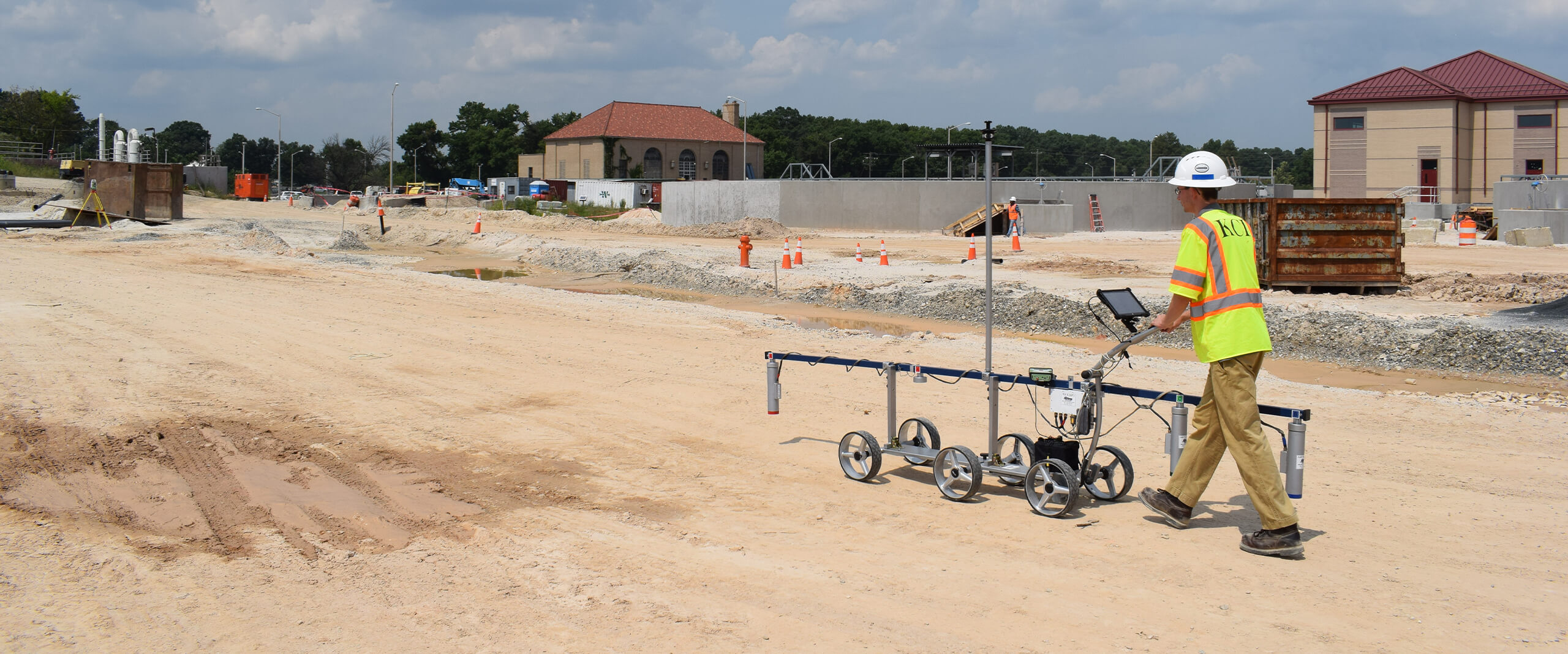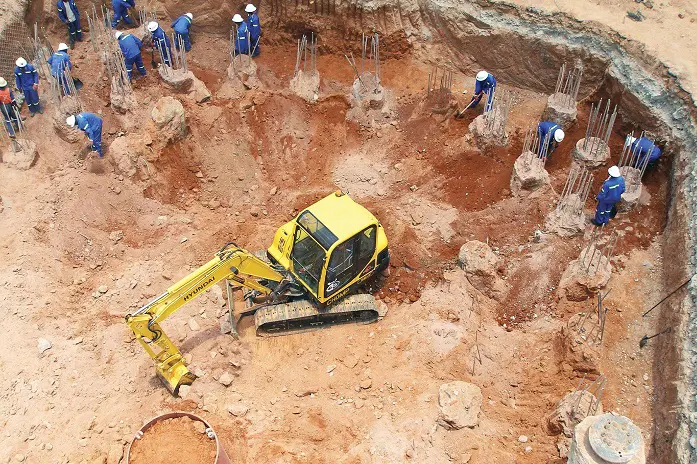Why All About Geotechnical Engineering Matters in Today's Framework Growth
Why All About Geotechnical Engineering Matters in Today's Framework Growth
Blog Article
The Value of Geotechnical Engineering in Resolving Ecological Obstacles and Enhancing Construction Safety
Geotechnical design offers as a keystone in the intersection of environmental stewardship and construction safety, supplying important understandings into the habits of dirt and rock under different problems. By executing tactical website investigations and customized mitigation actions, geotechnical designers play a crucial role in securing both human lives and environmental honesty.

Function of Geotechnical Design
Geotechnical design plays an important function in the style and construction of framework by resolving the actions of dirt and rock products under various conditions. This field of design is crucial for understanding the interaction in between structures and the ground, which includes figuring out the load-bearing capability of soil, assessing stability, and anticipating prospective negotiation or failure.
Geotechnical engineers are in charge of performing site investigations, which entail tasting and screening soil and rock to collect data on their chemical and physical residential properties. This info is crucial for making structures, preserving walls, and various other earth-retaining structures that ensure security and longevity. Furthermore, geotechnical design informs the choice of suitable building and construction approaches and products, thereby reducing dangers linked with soil actions.
Additionally, the combination of geotechnical design concepts right into metropolitan preparation and environmental monitoring is critical for dealing with challenges such as ground contamination and groundwater monitoring. By comprehending geotechnical factors, designers can create lasting remedies that improve the resilience of framework versus natural dangers, while likewise advertising ecological stewardship. Eventually, the role of geotechnical engineering is essential for accomplishing safe, sturdy, and ecologically conscious building and construction practices.
Dirt Erosion Reduction
Dirt erosion postures a substantial threat to both environmental stability and infrastructure integrity, affecting approximately 24 billion lots of abundant dirt shed every year worldwide. This sensation is intensified by elements such as deforestation, urbanization, and poor agricultural techniques. Geotechnical design plays a crucial role in developing effective dirt erosion mitigation methods that guard both the atmosphere and construction tasks.
One approach involves the application of disintegration control approaches such as greenery growing, which maintains soil through root systems. Additionally, the construction of preserving wall surfaces and balconies can properly minimize surface area overflow and safeguard prone areas from disintegration. Correct drain layout is also critical; it decreases water accumulation and routes excess overflow away from critical frameworks.
Moreover, geotechnical engineers utilize dirt stabilization techniques, such as the application of geotextiles and eco-friendly floor coverings, to enhance soil cohesion and avoid destruction - geotechnical specialist. Routine tracking and evaluation of erosion-prone sites allow prompt treatments, making sure long-lasting sustainability. By incorporating these strategies, geotechnical design not only reduces the effects of soil disintegration however also contributes to the strength of infrastructure versus environmental difficulties, inevitably cultivating a safer and a lot more sustainable built environment
Groundwater Security Strategies
Groundwater works as a vital source for drinking water, farming, and industrial procedures, making its security essential for environmental sustainability and public health and wellness. Reliable groundwater protection approaches are vital in alleviating contamination risks and making certain the durability of this resource.

Normal surveillance of groundwater top quality is also crucial, making it possible for early discovery of contamination resources and helping with prompt removal efforts. Utilizing innovative technologies, such as geophysical surveys and remote noticing, aids in identifying prospective hazards to groundwater reserves.
Additionally, public education and learning and stakeholder involvement are important, promoting neighborhood assistance for groundwater protection efforts. geotechnical engineer description. By integrating governing steps, technological developments, and neighborhood involvement, we can produce an extensive structure that safeguards groundwater resources while advertising sustainable development and construction practices
Landslide Danger Management
Landslides present substantial dangers to both human safety and framework, making efficient risk management techniques vital. Geotechnical engineering plays a crucial duty in determining, analyzing, and mitigating landslide risks. A detailed understanding of incline stability, soil auto mechanics, and hydrology is essential site here for establishing reliable risk administration plans.
The initial step in landslide risk management involves comprehensive website examinations, which include geological mapping and dirt screening. These examinations assist engineers evaluate the possibility for landslides by identifying critical elements such as incline angles, soil make-up, and water content. Making use of innovative technologies such as remote noticing and geophysical surveys can boost the accuracy of these analyses.
When threats are recognized, suitable reduction actions can be applied. These may include design options such as retaining wall surfaces, drain systems, and incline stablizing strategies. Checking systems need to be developed to spot indicators of ground motion and changes in water degrees, allowing for aggressive interventions.

Enhancing Building Safety
Construction sites frequently present a myriad of risks that can jeopardize worker safety and security and task honesty. Geotechnical design plays an important duty in improving building security by providing essential understandings right into subsurface problems. With detailed soil and rock analysis, geotechnical designers can recognize prospective risks, such as soil instability, groundwater concerns, and seismic susceptabilities, which may compromise the safety and security of building activities.
Carrying out geotechnical services, such as correct foundation style and the usage of keeping frameworks, mitigates these dangers significantly. These options not just guarantee the security of the structures being developed yet also produce a more secure working environment for building employees.
Moreover, fostering a culture of security with training and adherence to established safety and security methods better enhances construction site safety. By integrating geotechnical know-how right into the preparation and implementation stages, building and construction tasks can accomplish greater safety standards, ultimately safeguarding employees and making certain effective job completion.
Verdict
In final thought, geotechnical engineering offers as a crucial discipline in promoting and taking on ecological obstacles building safety and security. With efficient soil disintegration mitigation, groundwater defense methods, and landslide risk management, geotechnical engineers contribute to the development of resistant infrastructure.
Geotechnical engineering serves as a foundation in the junction of environmental stewardship and building safety and security, offering vital insights into the actions of soil and rock under different problems. Geotechnical design informs the selection of suitable building approaches and products, consequently lessening dangers linked with soil habits.
Geotechnical design plays a crucial function in establishing effective soil disintegration reduction methods that safeguard both the environment and building jobs.
Moreover, geotechnical engineers employ soil stabilization methods, such as the application of Your Domain Name geotextiles and eco-friendly floor coverings, to improve soil communication and stop degradation. Via extensive soil and rock evaluation, geotechnical engineers can recognize possible threats, such as soil instability, groundwater concerns, and seismic susceptabilities, which may endanger the security of see this page building tasks.
Report this page